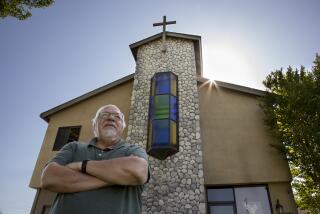Despite Increased Giving, Many Churches Feel the Effects of Economic Downturn : Finances: Layoffs at headquarters and offices of several denominations have come during the ‘time of pain.’
- Share via
NEW YORK — A batch of 30 workers at Episcopal headquarters, including several officers for specialized ministries, recently were laid off to cut denominational costs.
It’s the kind of belt-tightening being forced on many national religious organizations these days.
General economic doldrums and heavier demands on local congregations, such as for helping the homeless and AIDs sufferers, have siphoned off some support from national programs.
The pinch on them came despite increased U.S. religious giving, which totaled $65.76 billion in 1990 as estimated by the National Assn. of Fund-Raising Council, up 5.2%.
Nevertheless, in many cases, central outlays have had to be pared.
At Episcopal Church headquarters here, 52 positions were eliminated or combined with other jobs in September, with 30 employees dismissed, five retired and other spots phased out.
The fall retrenchments, reducing the staff by 18% from 291 to 239, were done “with a great deal of sadness and loss,” said Episcopal Presiding Bishop Edmond L. Browning.
But he expressed confidence that more dedicated performance and greater accountability of the trimmed-down staff would maintain effective work for the 2.5 million-member denomination.
Similar shake-ups have hit some other denominational centers.
In Chicago, the Evangelical Lutheran Church in America last May eliminated 25 staff positions because of budget shortfalls, laying off 16 workers and eliminating nine positions by attrition.
Bishop Herbert W. Chilstrom, head of the 5.2 million-member denomination, called the dismissals a “time of pain” both for those let go and the 505 staffers remaining. About 100 serve 65 regional synods.
“Whole programs and areas of ministry have been severely affected by these reductions,” Chilstrom said. There also were cuts in allocations to campus ministries, colleges and seminaries.
U.S. Roman Catholic bishops, at a meeting last June in St. Paul, Minn., agreed to cut the budget for their joint operations by 3%, or $1.1 million, to $34 million.
Their president, Archbishop Daniel Pilarczyk of Cincinnati, called it “modest fine-tuning” caused by necessary “belt-tightening on the local level in an era of inflationary spiral and economic downturn.”
Left untouched by the reductions was the church’s far-flung refugee resettlement work. But cuts of about 6% were projected for other departments of the Washington-based U.S. Catholic Conference. It employs about 400.
The 3 million-member Presbyterian Church (U.S.A.) cut back its Louisville, Ky., headquarters staff to 750 from a total of 1,100 in a 1988 restructuring after a 1983 merger of Northern and Southern branches.
The denomination this year imposed a hiring freeze on new positions because of an anticipated budget squeeze ahead.
“We’re not at a crisis stage now, but we’ve got one coming up in 1995,” said executive director David Stoner. He noted financial projections indicate a $6.1-million shortage that year, and steps were being taken to deal with it.
Under financial pressure, the National Council of Churches, including most major Protestant and Eastern Orthodox denominations, went through a major overhaul last year, combining 11 departments into four.
The staff at its New York headquarters has been cut by 46--from 381 to 335.
The biggest agency of the 9 million-member United Methodist Church, the Board of Global Missions, overcame 1987-88 budget deficits by cutting its staff by 17, including 11 executives, and restricting travel, consultants and hiring.
Another eight executive positions were eliminated in 1990.
Southern Baptists, based in Nashville, Tenn., and numbering 15 million, the nation’s largest Protestant body, also felt financial strains, with contributions to joint programs down for the first time in 25 years.
The denomination has been torn by a decade-long controversy in which “inerrantists”--those who insist the Bible is free of any kind of error--gained control of denominational institutions.
“Obviously, the controversy has to be a factor,” said Richard Rosenbaum, vice president for finance at denominational headquarters. He also blamed the economy.
More to Read
Sign up for Essential California
The most important California stories and recommendations in your inbox every morning.
You may occasionally receive promotional content from the Los Angeles Times.













